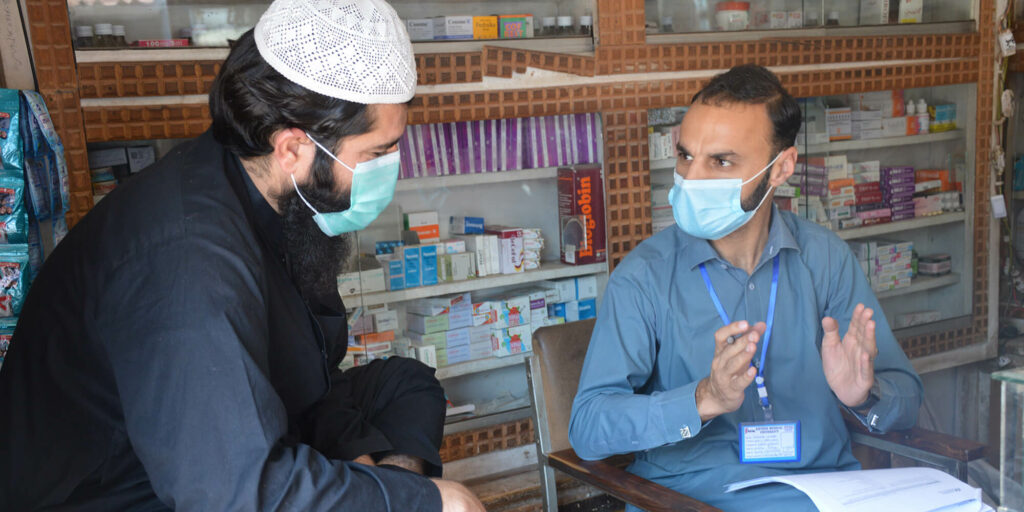Around the world, vaccines are one of the most studied, successful and cost-effective ways to improve health outcomes and save lives. However, vaccines work only if people recognize the need and value of immunization, and agree to be immunized.
Although approved COVID-19 vaccines are safe and effective, mass vaccination in Pakistan remains a challenge. According to the World Health Organization (WHO), vaccine hesitancy is one of the 10 most severe threats to global health. The WHO also reported that there are three main reasons behind refusal or unwillingness to be vaccinated: inconvenience in accessing vaccines, complacency and lack of trust.
Pakistanis have traditionally shown high levels of vaccine hesitancy, making it difficult to eliminate the spread of highly infectious diseases.
“There is a need to enhance public trust and share evidence-based knowledge on vaccine efficacy and safety through major sources of COVID-19 information, such as television, social media and healthcare workers,” says Dr. Khalid Rehman, Associate Professor at Khyber Medical University in Peshawar. The community can be convinced to get vaccinated if more published data on vaccine efficacy and safety is available.”
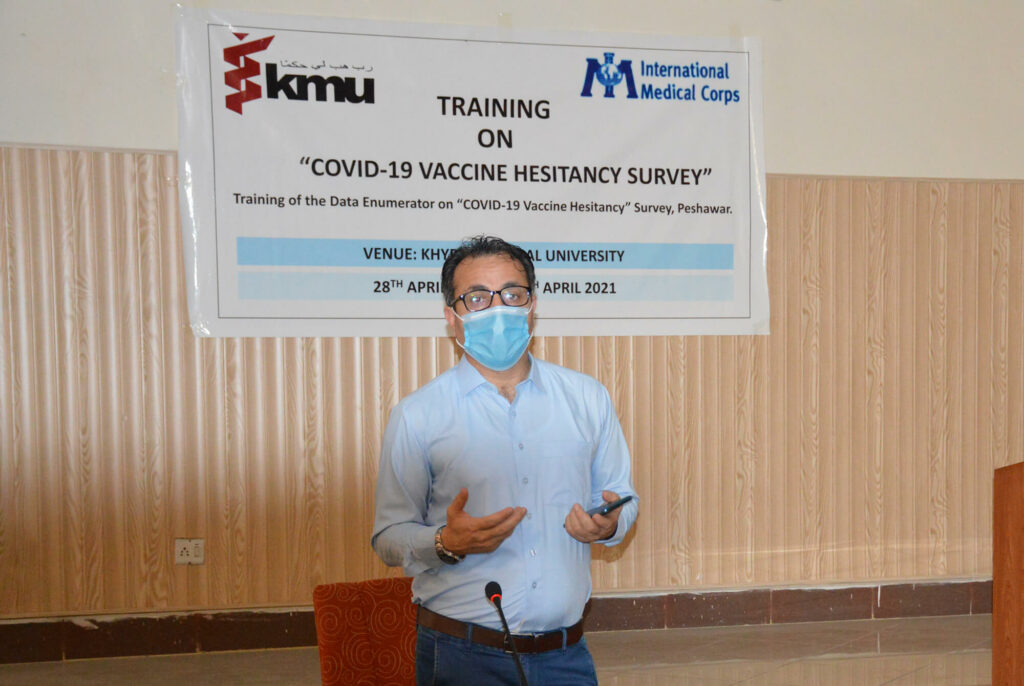
To identify and assess the reasons behind vaccine hesitancy in Pakistan, International Medical Corps worked with Pakistan’s Department of Health in Khyber Pakhtunkhwa province and Khyber Medical University in Peshawar to conduct a vaccine hesitancy survey. The survey team used the mixed-methods research technique, including qualitative and quantitative analysis, and involved 190,140 people from four Union Councils of Peshawar District, in Khyber Pakhtunkhwa province. Most of the participants were 30 to 39 years old.
The survey revealed that the majority of the respondents received information about COVID-19 vaccines from television, social media and healthcare workers. They said that healthcare workers are the most trustworthy source of information because they believe doctors are knowledgeable and informed.
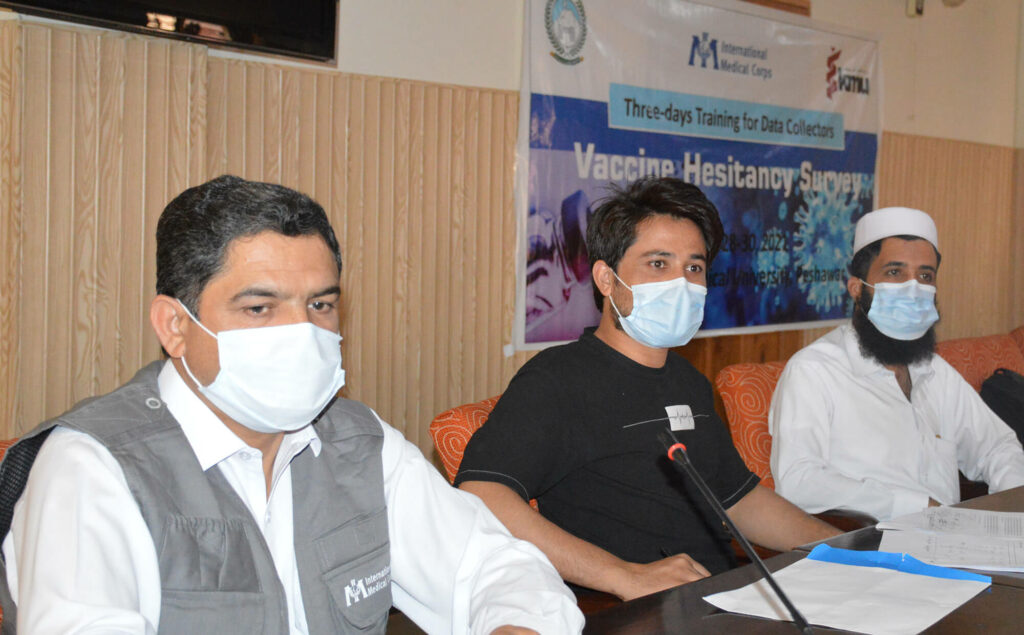
However, when several healthcare workers were interviewed, they expressed concern about not receiving up-to-date and accurate information about the virus.
“Lack of correct information among healthcare workers harms vaccination drives and leads to a higher refusal rate,” explains Dr. Bhisham Kotak, Program Director with International Medical Corps in Pakistan. “We need to raise awareness and train healthcare workers at every facility to share accurate information with their communities. Also, religious and community leaders must be involved, as they are important, trusted sources of information.”
Reasons for Vaccine Hesitancy
Across several vaccine hesitancy studies we’ve done, including in Pakistan, we’ve found that hesitancy is highest among women, refugees, displaced people and younger age groups. There are a number of reasons for that.
In Pakistan, due to cultural restrictions, women are less exposed to people outside their families and have few sources of information. Patriarchal values also place men’s healthcare needs first and women’s second.
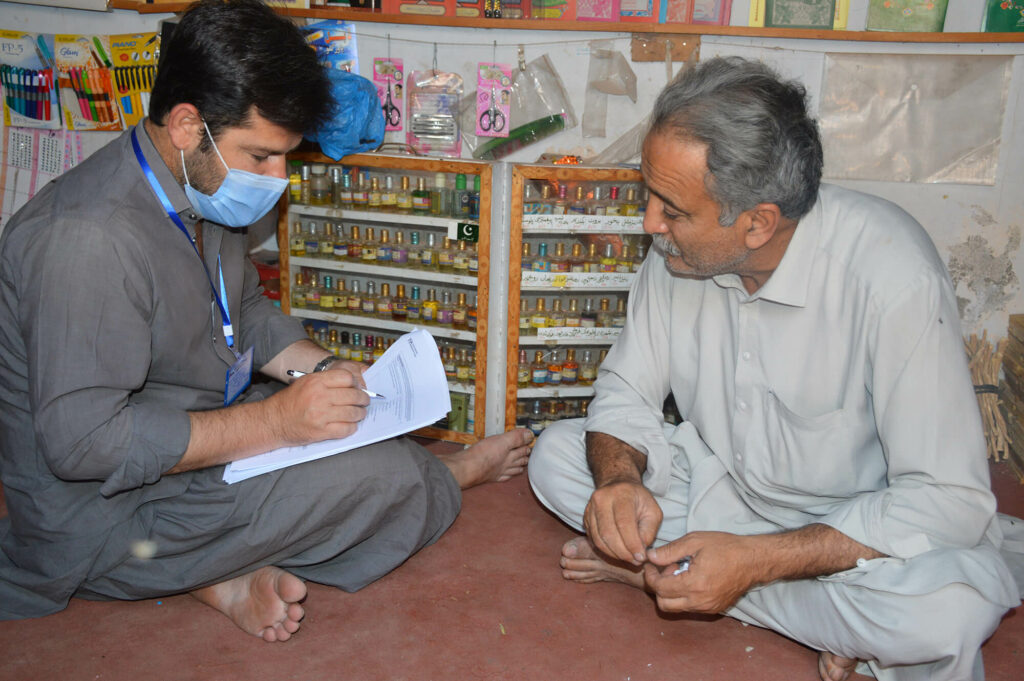
Our survey team found that 74% of women had not heard about COVID-19 vaccines. Their reasons for not getting vaccinated included, not having access to the technology required to register for the vaccine, not knowing where the vaccination centers are and not being allowed to go to the centers unaccompanied.
Another barrier for women, refugees and displaced people is a lack of confidence in health systems and their ability to safely administer vaccines. This feeling is common among marginalized communities worldwide—they do not trust the health system because they don’t feel they are a part of it.
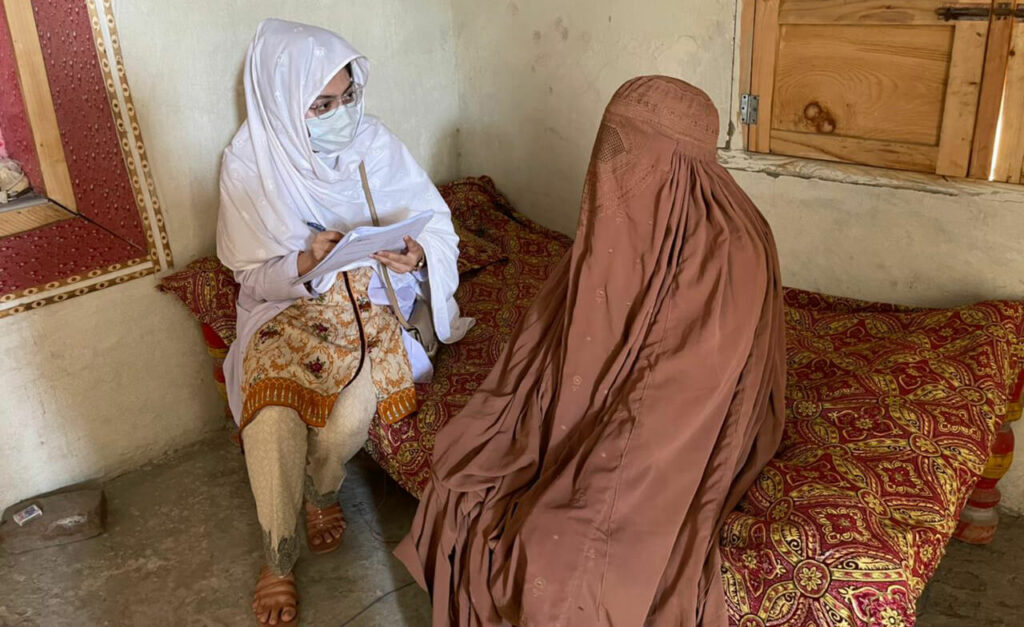
For younger age groups, the main issue is complacency. Because younger people believe that they are healthy and therefore not at risk of contracting COVID-19, they decide not to get vaccinated.
Across all age groups, social media plays an increasingly important role in spreading misinformation. Our survey found that 85% of the respondents use Facebook, where they come across different conspiracy theories about COVID-19 vaccines. Though they don’t trust the information on social media as much as other sources, it has some influence.
Of those surveyed:
- 70% believed there are other ways to prevent COVID-19 instead of the vaccine;
- 43% were hesitant to receive the vaccine;
- 28% of respondents were worried about experiencing vaccine side effects; and
- 24% have not been vaccinated because they are waiting for new, more effective vaccines.
Solving the Problem
Based on the results, International Medical Corps has made a number of recommendations to the Provincial Health Ministry of Khyber Pakhtunkhwa.
- Healthcare workers must receive accurate, up-to-date information and engage directly with their communities through advocacy and communication campaigns.
- Health authorities should implement mobile vaccination campaigns with trusted healthcare workers, to improve vaccine uptake.
- The government should share photos and videos of community leaders, politicians, health workers, celebrities and religious leaders getting vaccinated, to increase public confidence in the vaccine.
- Health authorities should use media— primarily TV and social media platforms—to counter misinformation, rumors and conspiracy theories.
- The Pakistan Electronic Media Regulatory Authority must ensure that media outlets engage in responsible reporting on COVID-19 and provide accurate information in coordination with health authorities.
As it battles vaccine hesitancy, Pakistan is moving forward with its vaccination program. The country received its first shipment of vaccine doses from China in January 2021 and began its campaign to vaccinate 70% of the eligible population. The government published a priority list for the first round of vaccine recipients, including frontline workers and people over 65. Those who wanted to receive the vaccine then enrolled using a web-based registration system. As of September 27, 2021, the government had administered more than 76 million doses.
